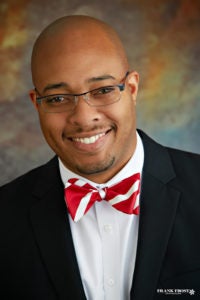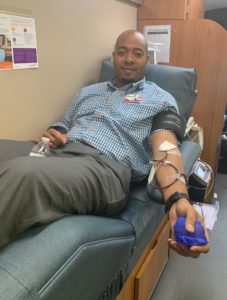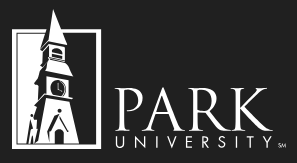
by Nuno Alves Primo, Graduate Assistant, University Engagement
With the world trying to adapt to a new normal due to COVID-19, new heroes have emerged. Those heroes are the essential workers who are putting themselves in harm’s way to make sure that everyone else has access to food and health services. One such hero is Park alumnus Denzil Ross, Chief Operating Officer at Lovelace Health System and Lead Administrator of the Heart Hospital of New Mexico. In the Q & A below, Denzil shares the precautions he is taking to keep his family and hospital staff safe, discusses how COVID-19 affected his job as a hospital administrator, and gives tips on how we can help our local health providers during these challenging times.
Nuno Alves Primo: How has COVID-19 affected your personal life?
Denzil Ross: COVID has given us [Denzil and his wife Dr. Dionne Ross] some early mornings and late nights. As employees who are critical to the business, we both are still working. We have had to change the way we interact with each other. We now exercise from home versus the gym. We are finding innovative ways to keep our kids busy and having fun at home with home scientific experiments.
NAP: You are managing a hospital and your wife is a medical doctor. What precautions are you taking to avoid infection?
DR: We are:
- Making sure we are wearing the appropriate Personal Protected Equipment (PPE) when we are at work;
- Washing and sanitizing our hands frequently;
- Monitoring our vitals, temperature and other known symptoms of COVID;
- Changing our clothes and shoes in the garage before going into the house;
- Depending on how the day goes and what areas we worked in, we are taking showers as soon as we get home before interacting with anyone.
Some may consider these measures to be drastic, but we believe it’s what we have to do to keep each other and our family safe.
NAP: As a hospital COO, what are the major issues that you have seen and experienced with the current crisis?
DR: A major issue we have with the crisis is that it was not something we were preparing for. Because of that, we had to take strict measures, we have had to make decisions on:
- How we distribute Personal Protective Equipment (PPEs),
- How and who enters the facility, restricting access,
- Types of surgical patients we need to cancel or postpone, and
- Making the necessary facility alterations to accommodate the possible influx of COVID-19 patients.
Along with all of those activities, there are financial impacts that we have to be mindful of as well. We have been planning for the worst and hoping for the best.
NAP: How has COVID-19 changed your role as a hospital administrator?
DR: Since the early days of March, we have activated our Incident Command Center, of which I have been the Incident Commander. Since then, every day and night, we have been in crisis mode, which essentially means re-writing the way we do business. All of the facilities’ alterations, rerouting of patients, re-designing of the units, and just about everything else was run through and approved by the Incident Command Center. I have a great team that helps balance the workload, but it’s a lot. The biggest challenge has been communication. With information changing so frequently, sometimes hour by hour, trying to keep everyone educated and having one source for the information has been a true challenge. A lot of what I do now is change management.
NAP: How badly were your hospitals affected by the shortage of PPEs and ventilators?
DR: We have not been affected to the level of other hospitals in other cities. We have had a shortage of PPEs, and while I think we have done a really good job of keeping our staff and patients safe, the initial shock to the hospital was dangerously scary. However, through support from the Albuquerque community, the NM Department of Health, and our corporate partners, we have been able to sufficiently supply our staff with the PPEs needed to continue their work safely. As far as ventilators go, we have had a sufficient number to meet our needs at this time.
NAP: What operations, responses, and precautions are you implementing long term because of the pandemic?
Since we have been forced to find new ways of doing business, some of those innovations have showed us that we could do things easier, faster, and cheaper. For example, all of our clinics started doing telemedicine. Until now, we utilized it at a minimal subset of our outpatient business. Moving forward, telemedicine may make a large footprint in our care delivery models. We created two Emergency Departments out of one; one side for possible COVID positive patients or patients with respiratory distress, and one for all other patients. During the flu season, we may be able to execute this model and be more efficient in how we treat patients. We have also made alterations in the hospital to created negative pressure units that we now can flip back and forth as we see patient needs increase. I believe this has given us the ability to expand our ICU bed count easily, and it’s going to give us a great option to use if ever needed again.
NAP: How can Park students, faculty, staff, and alumni help you and other hospitals?

DR: We have been getting support in several different ways from the community. We have received donations of everything; from pizza, donuts, coffee, energy drinks, etc. for the staff, to N95s and people donating face masks that they stitched and sewed themselves. The cloth masks played a big part in prolonging the life of our other masks. It has also helped by adding a light touch to an otherwise scary and tough situation. My mask displays the Kansas City Chiefs. I am still repping Kansas City in New Mexico.
More than anything, please continue to keep us in your prayers and send us positive energy.
NAP: What message do you have for Park students, faculty, staff, and alumni?
DR: Take heed to the precautions instituted by the CDC and what most states have now executed. Stay at home if you can, and practice social distancing. If you have to go to work, be cautious of your surroundings, and follow the 6-foot rule. Wash your hands and refrain from touching your face. Let’s put all these actions in place so we can flatten the curve and return to normal life, maybe in a new way. Keep yourself and your loved ones safe.
NAP: What lessons have you learned personally from working through this crisis?
DR: One of the things I have learned or maybe I knew it before, but this validated it for me: I strive in the midst of chaos. My personality fits it. My CEO mentioned to me a few days ago that he was able to notice the different personalities of the various leaders and how we were perfect for different times of this pandemic.
Phase one was total crisis mode. We had something that was actively affecting us and we needed leadership during that time to get us to stop the bleeding. Information was changing, sometimes by the hour and we had to create standard work on the fly. There was no blueprint for the task since everything was new or changing. I am a laid back person and during this phase one, I think a lot of people needed a leader who was calm, thoughtful and methodical in their processes and communication.
As we moved into phase two, how we get back to work after we stopped the bleeding, and phase three, planning for how do we operate once this is all over, some of my other leaders have stepped up to take bigger roles. While I am still leading the charge, I have enjoyed watching leaders develop in new ways in the midst of the unknown.

